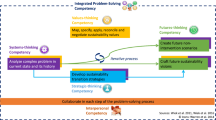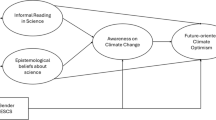Abstract
Many environmental problems are controversial because of conflicting values people hold and because there is not a consensus as to which values should have precedence over others. If environmental managers are to make ethical decisions that reflect environmental values, they must have full understanding of such values and types of ethics and principles of moral reasoning to use in the decision-making process. Unfortunately, integration of values into environmental curricula has often not been explicit or comprehensive. One result is that university-trained environmental managers do not possess the knowledge, skills, and methods necessary for more ethically based decisions. An analysis of attitudes about integrating values and/or ethics into environmental curricula and approaches to do so yields the conclusion that environmental programs should more fully include teaching about values and ethics so that environmental managers can make more ethically sound decisions.
Similar content being viewed by others
Literature cited
Attfield, R. 1983. The ethics of environmental concern. Columbia University Press, New York, New York.
Barbour, I. 1980. Technology, environment, and human values. Praeger Scientific, New York, New York.
Bartlett, R. V. 1986. Ecological rationality: Reason and environmental policy.Environmental Ethics 8:221–240.
Bok, D. 1982. Beyond the ivory tower. Harvard University Press, Cambridge, Massachusetts.
Caldwell, L. 1987. The contextual basis for environmental decisionmaking: Assumptions are predeterminants of choice.The Environmental Professional 9:302–308.
Care, N. S. 1982. Future generations, public policy, and the motivation problem.Environmental Ethics 4:195–214.
Carter, A. H., III. 1983. The teaching of values in colleges and universities.New Directions for Teaching and Learning 13:11–18.
Center for the Study of Education and Society. 1985. The Antaeus report (no publisher given).
Cutcliffe, S. H. (ed.). 1986. Science, technology, and society, vols. 1–56. Lehigh University, Bethlehem, Pennsylvania.
Disinger, J. F., and A. C. Schoenfeld (eds.). 1987. Focus on environmental studies.The Environmental Professional 9:185–274.
Earley, M. 1980. Valuing at Alverno: The valuing process in liberal education. Alverno Productions, Milwaukee, Wisconsin.
Hargrove, E. 1987. The value of environmental ethics.The Environmental Professional 9:289–294.
Kohlberg, L. 1971. Stages of moral development as a basis for moral education.In C. M. Beck, B. S. Critenden, and E. V. Sullivan (eds.). Moral education. Newman Press, New York, New York.
Lemons, J. 1984. Can the carbon dioxide problem be resolved?The Environmental Professional 6:52–77.
Lemons, J. 1985. Deep Springs College: An alternative approach to the teaching of values and change in environmental programs.The Environmental Professional 7:87–99.
Lemons, J. (ed.). 1987. Focus on environmental ethics.The Environmental Professional 9:277–368.
Lemons, J. (ed.). 1988. Focus on environmental ethics (II).The Environmental Professional 10:1–53.
Newell, L. J. 1982. Among the few at Deep Springs College: Assessing a seven-decade experiment in liberal education.The Journal of General Education 34:120–134.
Perry, W. G., Jr. 1970. Forms of intellectual and ethical development in the college years: A scheme. Holt, Rinehart and Winston, New York, New York.
Piaget, J. 1965. Moral judgement of the child. Free Press, New York, New York.
Regan, T. (ed.). 1984. Earthbound. Random House, New York, New York.
Rolston, H., III. 1987. Engineers, butterflies, worldviews.The Environmental Professional 9:295–301.
Schuman, D. 1981. Education and solipsism.Coevolution Quarterly Spring: 132–139.
Schwartz, A. M., and J. Miles. 1987. The status of post-secondary environmental education in North America.The Environmental Professional 9:352–356.
Shrader-Frechette, K. S., 1982. Environmental impact assessment and the fallacy of unfinished business.Environmental Ethics 4:37–47.
Simon, S., and J. Clark. 1975. Beginning values clarification: For the classroom. Pennant Press, San Diego, California.
Sloan, D. 1980. The teaching of ethics in the American undergradute curriculum, 1876–1976. Page 2in D. Callahan and S. Bok (eds.). Ethics teaching in higher education. Plenum Press, New York, New York.
Sollitto, S., R. M. Veatch, and D. Fenner. 1975. A selected and partially annotated bibliography of society, ethics and life sciences. Institute of Society, Ethics and Life Sciences, Hastings on Hudson, New York.
Study Group on the Conditions of Excellence in American Higher Education. 1984. Involvement in learning. U.S. Government Printing Office, Washington, DC.
Thompson, P. B. 1986. Uncertainty arguments in environmental issues.Environmental Ethics 8:59–76.
Thompson, P. B. 1987. Agricultural biotechnology and the rhetoric of risk: Some conceptual problems.The Environmental Professional 9:316–326.
Wasserman, E. R. 1980. Implementing Kohlberg's “just community” concept in an alternative high school. Pages 188–198in V. L. Erickson and J. M. Whiteley (eds.). Developmental counseling and teaching. Wadsworth, Belmont, California.
Wein, B. J. (ed.) No date. Peace and world order studies. World Policy Institute, New York, New York.
Whiteley, J. M. 1980. Extracurricular influence on the moral development of college students.New Directions for Higher Education 31:45–50.
Whiteley, J. M., and L. C. Loxley. 1980. A curriculum for the development of character and community in college students. Pages 262–297in V. L. Erickson and J. M. Whiteley (eds.). Developmental counseling and teaching. Wadsworth, Belmont, California.
Wolman, M. G. 1977. Interdisciplinary education: A continuing experiment.Science 198:800–804.
Author information
Authors and Affiliations
Rights and permissions
About this article
Cite this article
Lemons, J. The need to integrate values into environmental curricula. Environmental Management 13, 133–147 (1989). https://doi.org/10.1007/BF01868361
Issue Date:
DOI: https://doi.org/10.1007/BF01868361




